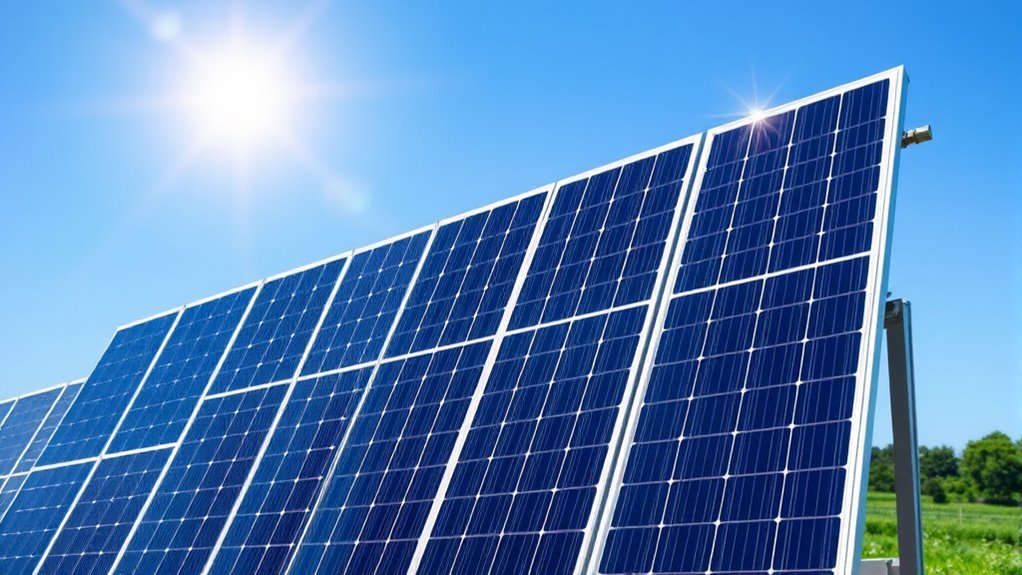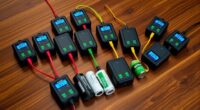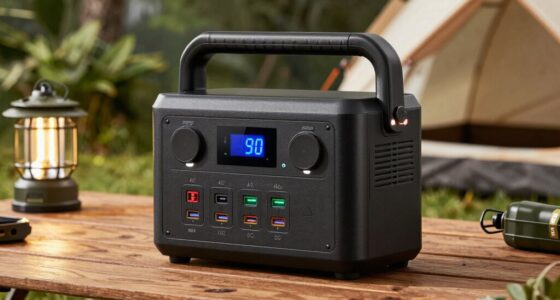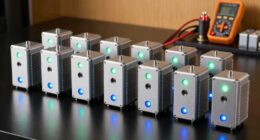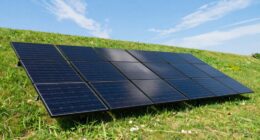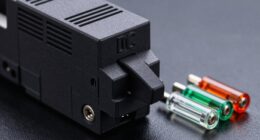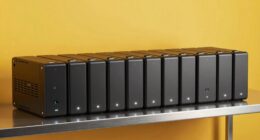Looking for reliable 180W rigid solar panels in 2025? I’ve found top options like the RICH SOLAR 200W monocrystalline, Newpowa 180W for off-grid use, and flexible models like Topsolar 180W for uneven surfaces. Bifacial panels and high-efficiency N-Type cells also deliver impressive performance in tough conditions. If you want durable, high-yield panels for your project, keep going—more details on the best choices await you.
Key Takeaways
- Rigid panels like Newpowa 180W and RICH SOLAR 200W offer durable, weather-resistant construction suitable for long-term outdoor use.
- Many models feature high-efficiency monocrystalline cells with 22-25% conversion rates for reliable power output.
- Designed with tempered glass and corrosion-resistant frames to withstand harsh weather conditions, including wind, snow, and hail.
- Pre-drilled mounting holes and included hardware enable straightforward installation on rooftops and fixed structures.
- Top models deliver consistent, long-lasting performance with minimal power degradation over time, ensuring dependable energy supply.
200W Bifacial Solar Panel, 9BB Monocrystalline, Dual-Sided Power Generation, High Efficiency 12V/24V Module
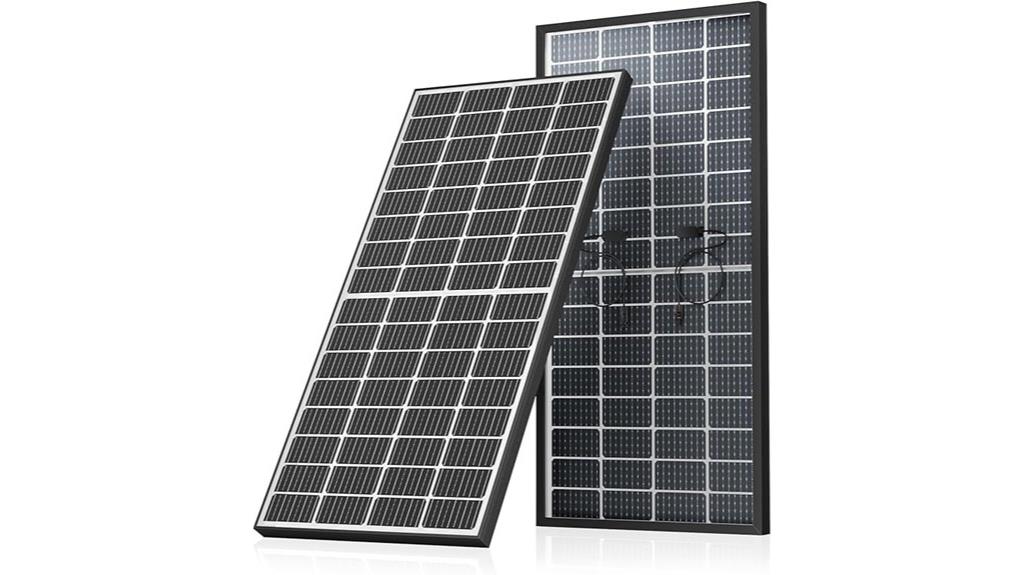
If you’re looking for a highly efficient and versatile solar panel, the W Bifacial Solar Panel with 9BB monocrystalline cells is an excellent choice. It captures sunlight from both sides, boosting energy output by up to 25.4%. Its advanced 9-busbar monocrystalline design guarantees stable, reliable performance even in shaded or low-light conditions. Perfect for off-grid setups like RVs, boats, or rooftops, it’s compatible with 12V and 24V systems. Built with durable tempered glass and corrosion-resistant aluminum, it withstands harsh weather. Quick to install, this panel maximizes energy harvest wherever you need reliable power.
Best For: off-grid homeowners, RV travelers, boat owners, and mobile setup enthusiasts seeking high-efficiency, durable solar power solutions.
Pros:
- Captures sunlight from both sides, increasing energy output by up to 25.4%.
- Equipped with advanced 9BB monocrystalline cells for stable performance under various conditions.
- Made with durable tempered glass and corrosion-resistant aluminum, suitable for harsh weather.
Cons:
- May require additional mounting hardware for optimal installation.
- Higher initial cost compared to traditional single-sided panels.
- Performance depends on reflective surface conditions to maximize bifacial gains.
RICH SOLAR 200W 12V Monocrystalline Solar Panel
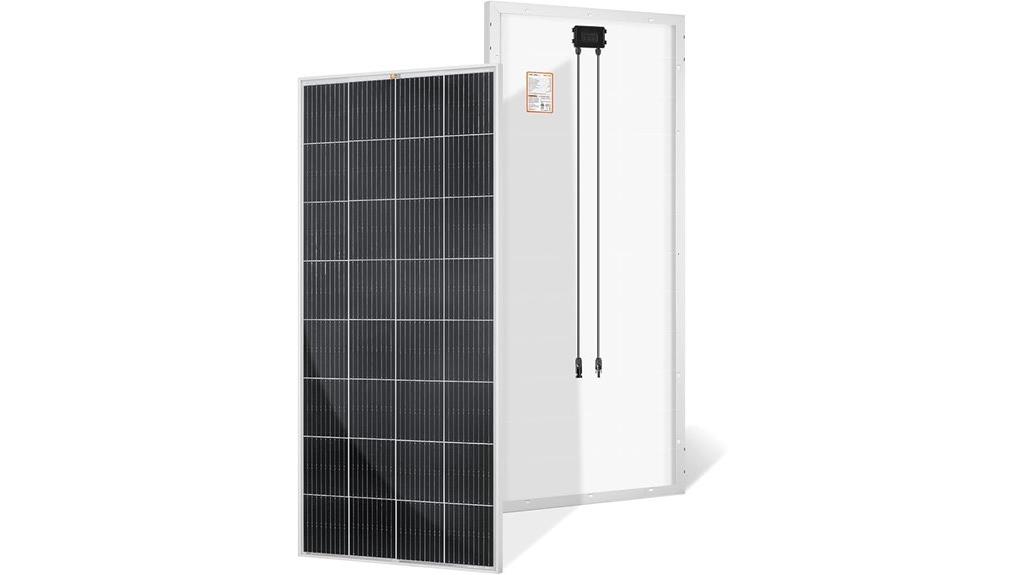
Looking for a reliable solar panel that delivers high efficiency for your off-grid or mobile setup? The RICH SOLAR 200W 12V Monocrystalline Solar Panel is exactly what you need. It produces 10.9 amps, perfect for charging 12-volt batteries in RVs, trailers, or marine applications. Designed for excellent performance even in low-light conditions, it works well during cloudy days and early mornings. Built with durable tempered glass and an anodized aluminum frame, it’s built to withstand tough environments. With 14 pre-drilled holes, installation is straightforward. Plus, it comes with a 25-year power warranty, giving you peace of mind for years to come.
Best For: RV owners, boaters, or off-grid enthusiasts seeking a durable, high-efficiency solar panel to reliably charge 12-volt batteries in various weather conditions.
Pros:
- High efficiency with 10.9 amps output, suitable for multiple applications
- Excellent performance in low-light conditions, including cloudy days and early mornings
- Rugged construction with tempered glass and anodized aluminum frame for durability
Cons:
- Fixed installation may require additional mounting equipment for some setups
- May be more expensive than lower wattage or less advanced panels
- Does not include mounting hardware or connectors, which must be purchased separately
N-Type 16BB 180W Portable Solar Panel
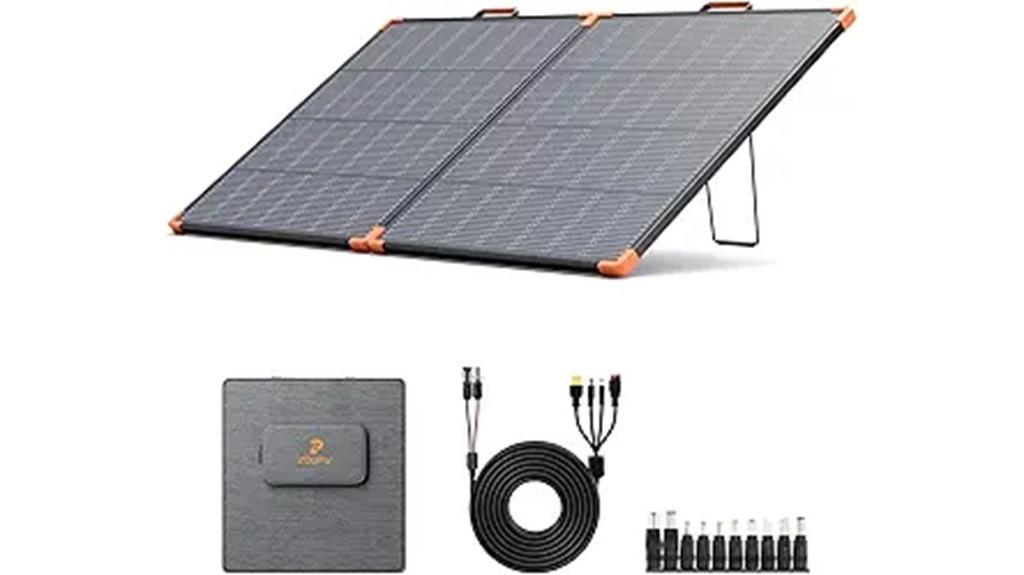
The N-Type 16BB 180W Portable Solar Panel stands out as an excellent choice for outdoor enthusiasts and emergency preparedness, thanks to its lightweight, foldable design and rugged construction. Weighing just 12.4 pounds, it’s easy to carry and quick to set up—no tools needed, with a 5-second deployment. Made from durable monocrystalline silicon with weather-resistant ETFE coating and reinforced hinges, it withstands harsh conditions. Its high efficiency of 25% and ability to produce over 400W in real-world conditions ensure reliable power. Complete with versatile connectors, a sturdy carrying case, and a 3-year warranty, it’s built for longevity and dependable performance.
Best For: outdoor enthusiasts, campers, and emergency preppers seeking a lightweight, durable, and high-efficiency portable solar panel for reliable off-grid power.
Pros:
- Easy to set up in just 5 seconds without tools, ideal for quick deployment.
- Rugged construction with weatherproof ETFE coating and reinforced hinges for durability in harsh conditions.
- High conversion efficiency of 25% and real-world output over 400W, ensuring dependable power supply.
Cons:
- Some users report minor cosmetic scratches and hinge looseness over time.
- Stand design may be slightly flimsy or less adjustable in earlier models.
- Handles and stands could benefit from UV-resistant covers and longer, more adjustable options.
Topsolar 180W Semi-Flexible Monocrystalline Solar Panel
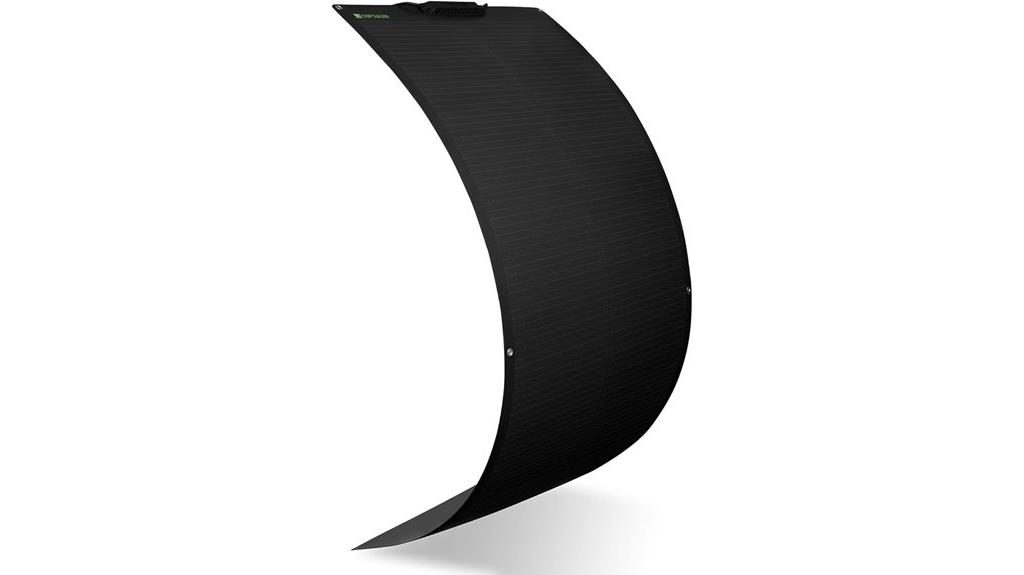
The Topsolar 180W Semi-Flexible Monocrystalline Solar Panel stands out as an excellent choice for those seeking versatile, lightweight solar solutions for irregular surfaces. Its flexible design, with a minimum bend radius of 40cm, lets you install it on trailers, boats, tents, and uneven roofs easily. Weighing just about 3.97 pounds and only 0.1 inches thick, it’s simple to transport and mount. Thanks to high-efficiency monocrystalline cells with back contact technology, it delivers up to 50% higher energy output than standard panels. Made from durable ETFE and TPT materials, it’s built to last, resist heat, and perform reliably in various environments.
Best For: outdoor enthusiasts and DIYers needing lightweight, flexible solar panels for irregular or hard-to-reach surfaces like RVs, boats, tents, and uneven roofs.
Pros:
- Highly flexible with a minimum bend radius of 40cm, suitable for uneven surfaces
- Lightweight at approximately 3.97 pounds and only 0.1 inches thick for easy transport and installation
- High-efficiency monocrystalline cells with back contact technology offering up to 50% more energy output than standard panels
Cons:
- Requires a compatible controller/regulator for battery protection and system integration
- May have limited output if surfaces are heavily curved beyond its flexibility range
- Durability depends on proper installation and environmental conditions, which may require careful handling
Newpowa 180W Monocrystalline Solar Panel for RV and Off-Grid Use
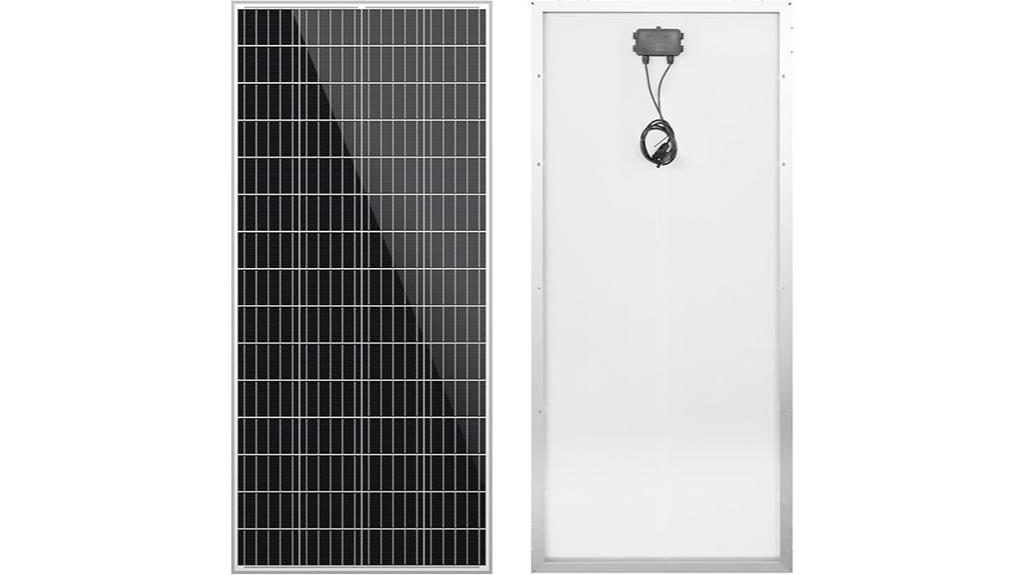
If you’re searching for a durable, high-efficiency solar panel suited for off-grid adventures, the Newpowa 180W Monocrystalline Solar Panel stands out as an excellent option. Its robust frame handles high winds and snow loads, making it ideal for RVs, trailers, and rooftops. With a maximum power output of 180W and high efficiency, it performs well in ideal sunlight, though real-world results may vary. Easy to install with pre-attached wiring and mounting holes, it integrates smoothly with various off-grid systems. Backed by a 2-year warranty and positive reviews, it’s a reliable choice for those seeking dependable renewable energy on the go.
Best For: RV owners, campers, and off-grid enthusiasts seeking a durable, high-efficiency solar panel for mobile or remote renewable energy setups.
Pros:
- High-efficiency monocrystalline design delivering up to 180W power output.
- Robust frame and construction capable of withstanding high winds and snow loads.
- Easy installation with pre-attached wiring and pre-drilled mounting holes.
Cons:
- Actual power output in real-world conditions may be lower than advertised, sometimes around 60-90W per panel.
- Performance can vary depending on sunlight, cable quality, and system configuration.
- Slightly larger size may require additional mounting considerations for certain setups.
10BB Cell 180W Monocrystalline Solar Panel
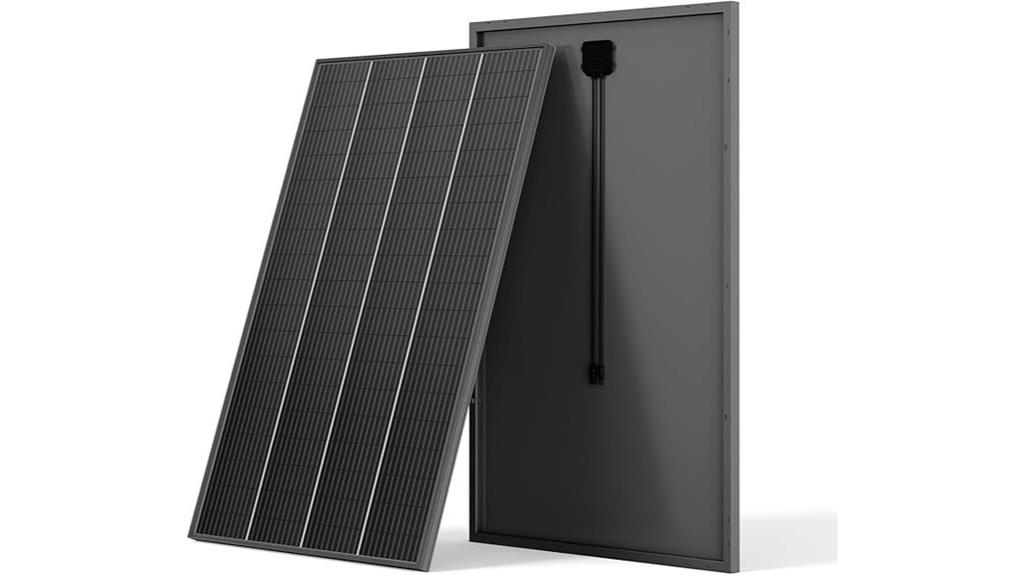
For those seeking a reliable, high-efficiency solar panel, the BB Cell 180W Monocrystalline Solar Panel stands out with its impressive 22.3% conversion efficiency. Its advanced 10BB solar cell design and high-quality Grade cells deliver consistent 180W power, generating around 720Wh daily in four hours of sunlight. Built with durable materials, it’s resistant to hail, snow, and ice, ensuring long-term outdoor performance. The aluminum frame adds stability, and pre-drilled holes make installation straightforward. With over 90% of its power retained after 10 years, this panel offers dependable, long-lasting energy for RVs, boats, sheds, and off-grid setups.
Best For: outdoor enthusiasts, RV owners, and off-grid users seeking a durable, high-efficiency solar panel for reliable power supply.
Pros:
- High conversion efficiency of 22.3% ensures maximum energy output
- Durable construction resistant to hail, snow, and ice for long-term outdoor use
- Easy installation with pre-drilled holes and plug-and-play wiring
Cons:
- Limited to 180W, which may require multiple panels for higher energy needs
- Performance slightly decreases over 25 years, common with all solar panels
- May require compatible mounting hardware for optimal tilt and positioning
DOKIO 150W 18V Monocrystalline Solar Panel
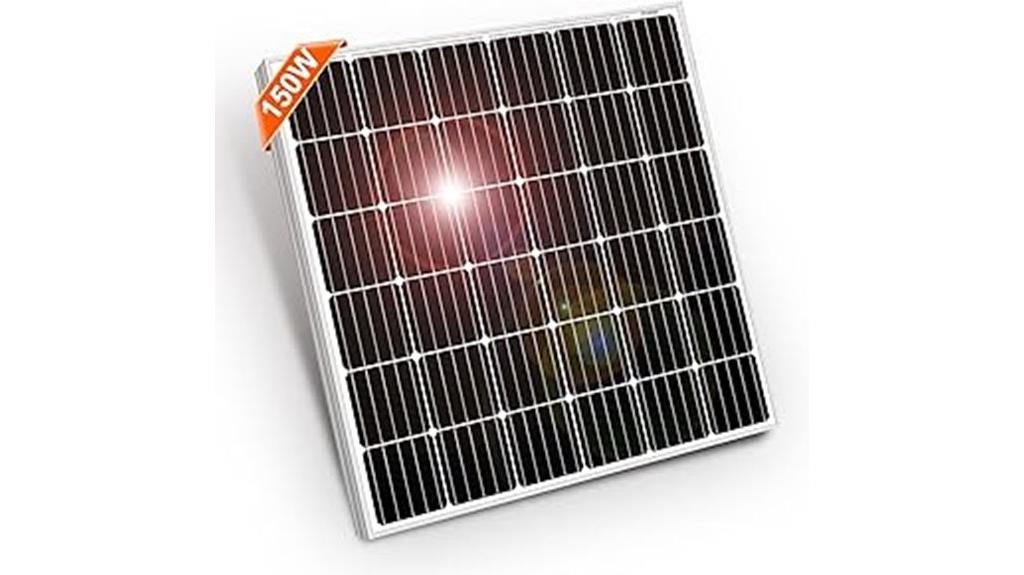
Looking for a reliable, high-efficiency solar panel that’s perfect for off-grid applications? The DOKIO 150W 18V Monocrystalline Solar Panel fits the bill. It features a sturdy aluminum frame, resistant to high winds (2400Pa) and snow loads (5400Pa), making it durable in tough conditions. Its monocrystalline silicon design delivers up to 150W, with compatibility for 12V batteries or series wiring for 24/48V systems. Easy to install, it includes pre-drilled holes, mounting hardware, and built-in bypass diodes for protection. Customers appreciate its affordability, quick setup, and solid performance, especially when paired with MPPT controllers for maximum efficiency.
Best For: off-grid users seeking a durable, high-efficiency solar panel for RVs, boats, or home energy setups.
Pros:
- High efficiency with monocrystalline silicon for better power output
- Durable aluminum frame resistant to strong wind and snow loads
- Easy installation with pre-drilled holes and included hardware
Cons:
- Slight discrepancy between rated and actual wattage in real-world conditions
- Surface may be prone to scratches or damage from hail if not properly protected
- Packaging during shipping can sometimes result in minor damage or handling issues
180 Watt Flexible Solar Panel with Mounting Holes
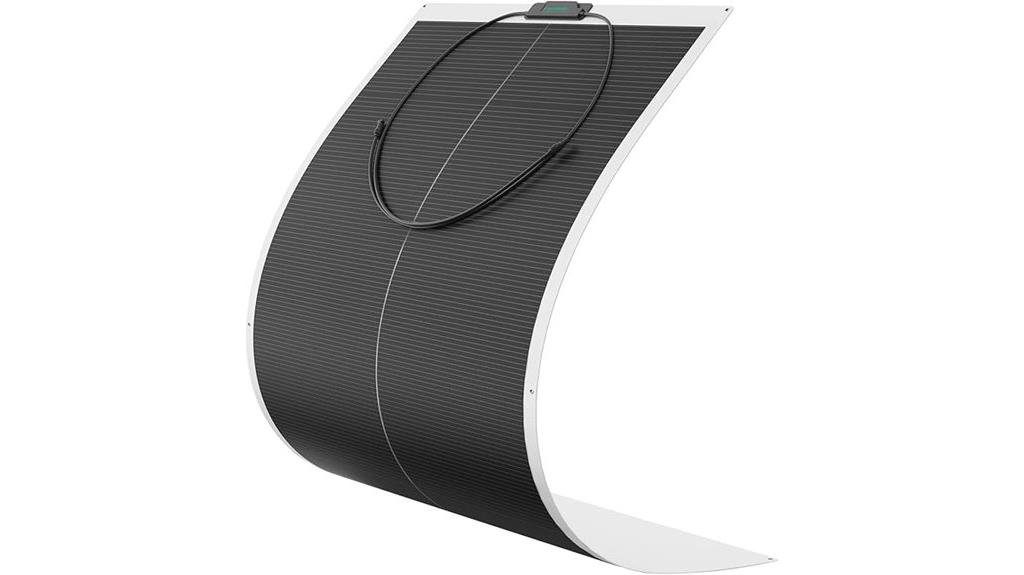
The 180-watt flexible solar panel with mounting holes stands out for those seeking a lightweight, adaptable power solution. It uses high-efficiency monocrystalline cells with half-cut PERC technology, boosting output by 25%. Its flexibility allows it to bend up to 240 degrees, making it perfect for curved surfaces like RVs, boats, or irregular roofs. Made from advanced, lightweight polymers, it’s 70% lighter than traditional panels and just a tenth of an inch thick, easing transport and installation. Built with durable ETFE material and sealed junctions, it’s water-resistant and withstands extreme conditions, offering reliable performance and long-lasting service.
Best For: outdoor enthusiasts, RV owners, boaters, and anyone needing a lightweight, flexible solar solution for curved or irregular surfaces.
Pros:
- High-efficiency monocrystalline cells with half-cut PERC technology for 25% increased output
- Extremely flexible, bending up to 240 degrees for versatile installation on curved surfaces
- Lightweight and thin, making transportation, mounting, and removal easier
Cons:
- May be less durable than rigid glass panels over extended heavy use in harsh environments
- Requires careful handling during installation to avoid damage due to flexible design
- Limited to 180 watts, which might be insufficient for high energy demands in some applications
Renogy 200W ShadowFlux N-Type Solar Panel

Renogy’s 200W ShadowFlux N-Type Solar Panel stands out as an excellent choice for off-grid enthusiasts seeking reliable performance in shaded conditions. Its 25% efficiency with advanced 16BB high-performance cells guarantees consistent power output, even in partial shade. ShadowFlux technology diminishes hot-spot risks, extends panel lifespan, and boosts energy generation in challenging environments. Its compact, lightweight design makes installation easier, and its IP67 rating guarantees durability against snow, rain, and hail. With a 5-year warranty and 25-year power output guarantee, this panel offers long-term reliability. It’s especially effective when paired with MPPT controllers, maximizing charging efficiency in various off-grid applications.
Best For: off-grid enthusiasts, RV owners, and remote cabin dwellers seeking reliable, shaded-condition solar power with durable and efficient panels.
Pros:
- High 25% efficiency with advanced 16BB high-performance cells for consistent output in shaded conditions
- ShadowFlux anti-shading technology reduces hot-spot risks and extends panel lifespan
- Durable IP67-rated construction withstands extreme weather such as snow, rain, and hail
Cons:
- High optimal voltage (~28V) limits efficiency when used with PWM controllers on 12V systems
- Slightly higher price point compared to newer, higher-wattage panels of similar cost
- Shorter lead lengths may require additional wiring for flexible installation
Renogy 175W N-Type Solar Panel for Off-Grid Applications
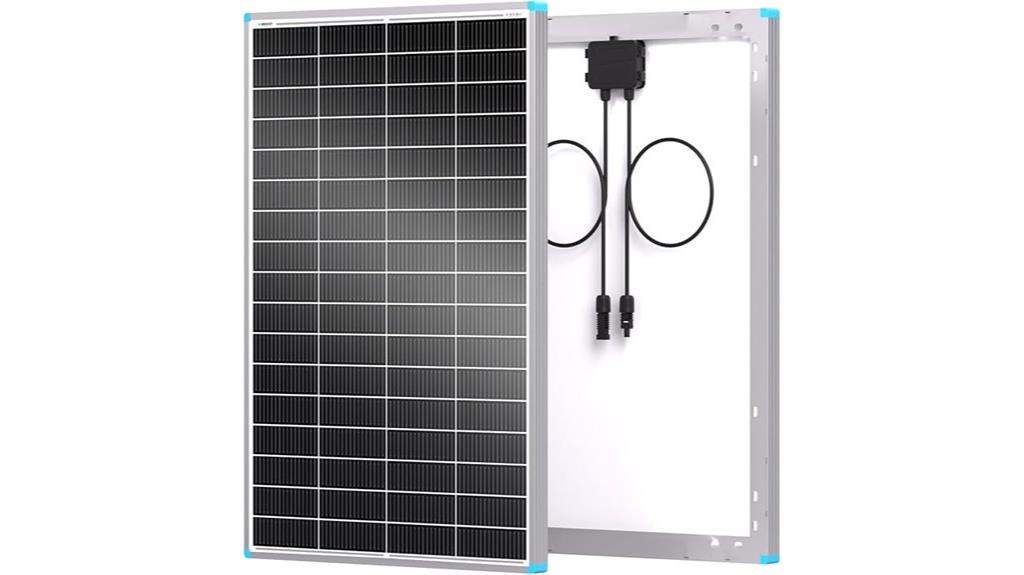
If you need a compact, efficient solar panel for off-grid applications, the Renogy 175W N-Type model is an excellent choice. It features a high efficiency of 25% thanks to advanced 16BB cell technology, ensuring better energy conversion and durability. Its small size (43.7L x 30.1W x 1.2H inches) and lightweight design make it perfect for tight spaces like RVs, boats, or cabins. Built with all-weather materials, it withstands snow, rain, and heat. With a 25-year lifespan and reliable power output, it quickly charges batteries, even in hot climates. Its portability and performance make it a versatile, dependable solar solution.
Best For: individuals seeking a compact, high-efficiency solar panel for off-grid setups in tight spaces like RVs, boats, or small cabins.
Pros:
- High efficiency of 25% due to advanced 16BB cell technology, ensuring strong energy conversion.
- Compact and lightweight design (43.7L x 30.1W x 1.2H inches, around 25.4 lbs), ideal for limited space and portability.
- Durable all-weather construction with tempered glass and corrosion-resistant frame, suitable for snow, rain, and heat.
Cons:
- Shipping experiences can vary, with some orders delayed or damaged during transit.
- Packaging may sometimes lack sufficient sealing, risking transit damage.
- Slightly higher cost per panel when not purchased during sales or promotions.
200 Watt Monocrystalline Solar Panel, 25% Efficiency, N-Type 12V PV Module for Off-Grid Systems

For those seeking reliable off-grid power solutions, the Watt Monocrystalline Solar Panel with 25% efficiency and N-Type technology stands out as an excellent choice. This 200W panel offers high photoelectric conversion, thanks to advanced 18BB N-Type cells that boost efficiency and durability. Its robust construction includes tempered glass, aluminum framing, and waterproofing, ensuring longevity in harsh environments. With pre-drilled holes for easy installation, it’s perfect for RVs, boats, rooftops, and off-grid systems. Rated to last over 30 years and backed by a 10-year warranty, it’s a dependable, high-performance option for sustainable energy needs.
Best For: off-grid homeowners, RV travelers, and boat owners seeking durable, high-efficiency solar power solutions for sustainable energy independence.
Pros:
- High 25% efficiency with advanced 18BB N-Type technology for better energy output and longevity
- Robust construction with tempered glass, waterproofing, and a durable aluminum frame, suitable for harsh environments
- Easy installation with pre-drilled holes compatible with various brackets and mounting setups
Cons:
- Does not include batteries or an integrated storage system
- Weighs 25.8 pounds, which may require additional support during installation
- Limited to 200W power output, which might be insufficient for larger energy needs without multiple panels
EF ECOFLOW 175W Solar Panel with High-Efficiency N-Type Cells
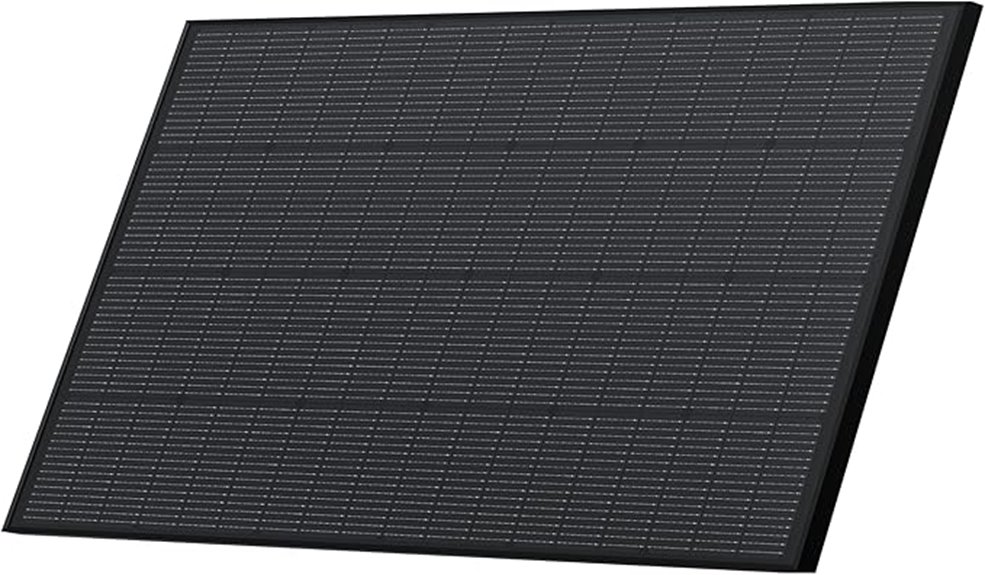
The EF ECOFLOW 175W Solar Panel stands out as an excellent choice for mobile and off-grid users thanks to its high-efficiency N-type solar cells that deliver up to 25% conversion efficiency. Its compact 46.3-inch length makes it perfect for Class B van roofs without obstructing awnings. Designed for durability, it features an anti-corrosive aluminum frame, tempered glass, and an IP68 rating for water and dust resistance. It performs reliably even in dull or overcast conditions, thanks to its low-temperature coefficient. Easy to install with pre-cut mounting holes and included hardware, it’s a dependable, high-performance power solution for portable and off-grid applications.
Best For: mobile and off-grid users seeking a high-efficiency, durable solar panel that fits easily on van roofs and performs reliably in various weather conditions.
Pros:
- High conversion efficiency of up to 25%, maximizing power output
- Compact design (46.3 inches) ideal for van roofs and limited spaces
- Durable construction with anti-corrosive aluminum frame and IP68 waterproof rating
Cons:
- May be less suitable for large-scale stationary solar installations due to its size and power rating
- Installation requires pre-cut mounting holes and hardware, which might not be compatible with all surfaces
- Higher cost compared to lower-efficiency panels with similar wattage
Factors to Consider When Choosing a Rigid Solar Panel 180W
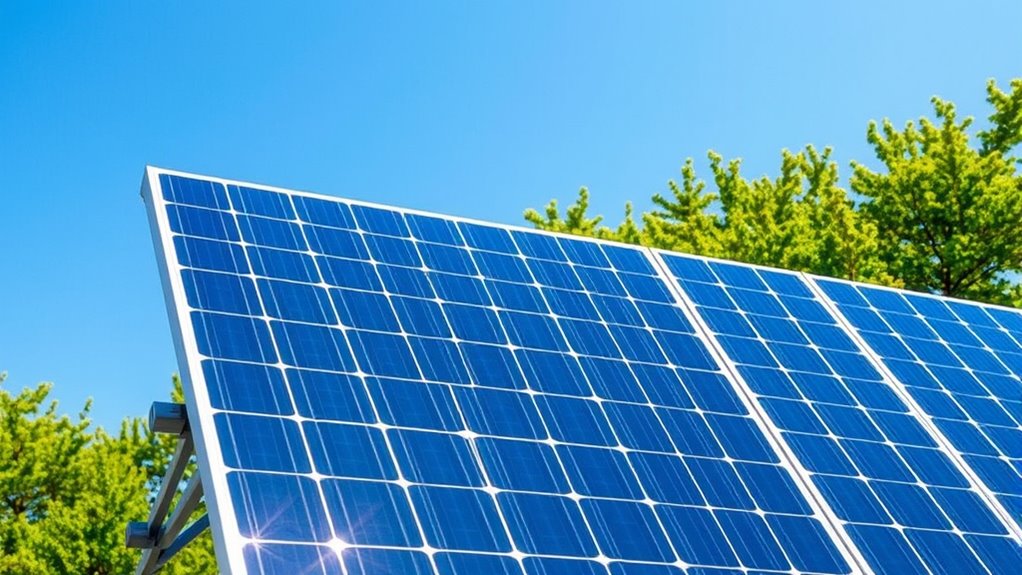
When choosing a 180W rigid solar panel, I consider key factors like efficiency standards to guarantee I get maximum power, along with durability for all weather conditions. Size and weight matter for installation, and compatibility with existing wiring can save time and hassle. Finally, I look at how easy it is to install, so I can set it up quickly and confidently.
Power Efficiency Standards
Power efficiency standards are essential because they determine how well a 180W rigid solar panel converts sunlight into usable electricity. Higher efficiency ratings, like 22-25%, mean the panel produces more power in less space or shaded conditions, maximizing energy output. Advanced cell technologies such as N-Type or monocrystalline cells can boost efficiency beyond traditional P-type cells, offering better performance. While efficiency ratings are tested under standard test conditions (STC), real-world factors like weather and shading can affect actual results. Choosing panels that meet or surpass industry efficiency standards assure you get the most energy from your investment, leading to reliable power generation and better long-term value. Prioritizing efficiency helps optimize your solar setup for consistent, efficient performance.
Durability and Weatherproofing
Ever wondered how to guarantee your 180W rigid solar panel withstands harsh outdoor conditions? The key lies in its durability and weatherproofing features. Look for panels with a tempered glass surface rated for impacts and extreme weather—this prevents cracking and damage over time. A corrosion-resistant aluminum frame is essential, especially if you’ll face humidity or salt spray, ensuring long-term integrity. Verify the waterproof rating; IP65 or higher is ideal to resist rain, snow, and dust without losing performance. Additionally, check that the junction box and wiring are sealed, preferably with an IP68 rating, to prevent moisture ingress. Weather-resistant coatings and materials that tolerate thermal expansion, UV exposure, and temperature fluctuations further ensure your panel’s reliability in diverse outdoor conditions.
Size and Weight
Choosing the right size and weight for a 180W rigid solar panel is essential because these factors directly affect installation, portability, and overall system performance. Most panels measure around 58 to 66 inches long and 26 to 30 inches wide, so you need to guarantee they fit your available space. The weight typically ranges from 15 to 40 pounds, impacting how easy they are to handle and mount. Thinner panels tend to be lighter but might be more fragile, while thicker frames offer durability but add weight. Heavier panels often have stronger construction, making them better suited for harsh weather. Balancing size and weight helps optimize portability, ease of installation, and system efficiency based on your specific needs.
Compatibility and Wiring
When selecting a 180W rigid solar panel, confirming compatibility with your existing system is essential to maximize efficiency and safety. First, check that the panel’s voltage and current ratings match your system’s requirements to prevent damage and optimize performance. Consider whether the panel supports series or parallel wiring—this allows you to expand capacity or increase voltage as needed. Make sure your charge controller—whether MPPT or PWM—is compatible with the panel’s output to get the most energy transfer. Also, verify the connectors and cable types align with your wiring setup or if adapters are necessary. Finally, review the panel’s maximum power point (Pmax) to ensure it operates effectively within your system’s voltage and current limits, avoiding underperformance or overload.
Installation Ease
Installing a 180W rigid solar panel becomes much easier when you consider its design features and compatibility with your mounting setup. Most panels come with pre-drilled holes and standardized mounting points, which streamline the installation process. Lighter panels are easier to handle and mount quickly, saving time and effort. Compatibility with common hardware like Z-brackets or ground mounts further simplifies installing the panel securely. Clear, detailed instructions or manuals are essential—they guide you through proper placement, wiring, and securing the panel properly. Additionally, integrated connectors such as MC4 or quick-connect cables make electrical connections faster and more secure. Overall, choosing a panel with these features minimizes installation complexity, making setup smoother and less time-consuming.
Price and Warranty
Price and warranty are key factors to weigh when selecting a 180W rigid solar panel. A longer warranty, like 25 years on power output, signals better long-term reliability and confidence from the manufacturer. While higher-priced panels often feature superior build quality, efficiency, and added benefits like weatherproofing and versatile mounting options, they can save you money over time through reduced maintenance and repairs. Some panels also offer extended warranties on materials and craftsmanship, providing extra protection against manufacturing defects. Comparing warranty terms carefully ensures the manufacturer’s support meets your expectations for durability and environmental conditions. Ultimately, investing a bit more upfront in a panel with a thorough warranty can offer peace of mind and better value throughout its lifespan.
Brand Reputation
Choosing a reputable brand is crucial because it often reflects the quality and reliability of a 180W rigid solar panel. Well-known brands tend to offer longer warranties, which show confidence in their panels’ durability and performance. They also meet industry standards and certifications, ensuring safety and reliable operation. Established brands usually provide better customer support, making troubleshooting and warranty claims easier. Additionally, positive reviews and industry recognition can indicate consistent quality and high customer satisfaction. By selecting a trusted brand, you reduce the risk of receiving counterfeit or substandard panels that might underperform or fail prematurely. In the long run, investing in a reputable brand helps ensure your solar system remains dependable and efficient.
Frequently Asked Questions
How Do Rigid Solar Panels Perform in Extreme Weather Conditions?
Rigid solar panels perform well in extreme weather, but their durability depends on quality. I’ve found that high-quality panels withstand heavy snow, hail, and high winds better because of sturdy frames and tempered glass. However, I always guarantee proper installation and regular maintenance to prevent damage. While they’re tough, extreme temperatures can reduce efficiency temporarily. Overall, I trust reliable panels to handle harsh conditions with proper care.
What Is the Typical Lifespan of a 180W Rigid Solar Panel?
A 180W rigid solar panel typically lasts around 25 to 30 years, which is nearly an eternity in the renewable energy world. I’ve seen panels still performing well after decades, proving their durability. Proper maintenance and installation can extend their lifespan even further. Rest assured, investing in quality panels means you’re getting a reliable power source that will serve you for many years to come, making it a smart long-term choice.
Are There Warranty Options Available for These Solar Panels?
Yes, there are warranty options available for 180W rigid solar panels. I’ve found that most manufacturers offer warranties ranging from 10 to 25 years, covering both product defects and performance issues. It’s important to read the fine print to understand what’s included, but generally, these warranties give you peace of mind, ensuring your investment is protected over the long term.
How Easy Is Installation for Different Rigid Panel Models?
Installing these rigid panels is pretty straightforward, almost like assembling a well-crafted piece of furniture. Most models come with detailed instructions and mounting hardware, making setup manageable even if you’re a DIY enthusiast. Some designs are lighter and easier to handle, while others might require a bit more effort. Overall, I find that with patience and proper tools, installation is smooth and rewarding, much like opening a new power source.
Can These Panels Be Integrated With Existing Solar Power Systems?
Yes, these panels can definitely be integrated with existing solar power systems. I’ve found that most 180W rigid panels are compatible with standard inverters and mounting setups. However, I recommend checking your system’s specifications and possibly consulting a professional to guarantee seamless integration. This way, you can maximize efficiency and avoid potential compatibility issues, making your solar upgrade smooth and hassle-free.
Conclusion
Imagine the perfect setup—power flowing steadily, no worries about reliability. With these top 180W rigid solar panels, you’re one step closer. But which one will truly meet your needs? The choice isn’t simple, and the right panel could be the key to revealing endless off-grid adventures or reliable backup power. Ready to make that leap? The future of dependable solar power is waiting—are you prepared to seize it?

